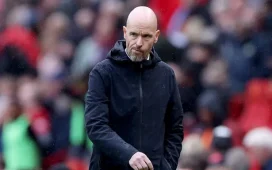
Media playback is unsupported on your device
Sajid Javid has said his resignation as Chancellor was necessary to uphold the “national interest” and sensible “checks and balances” in government.
He quit the cabinet in the prime minister’s ministerial reshuffle after a row over his advisers.
In a personal statement in the Commons explaining his decision, he defended the Treasury’s independence and said it must be able to “speak truth to power”.
He also warned the government not to abandon its fiscal discipline.
He offered his full support to Boris Johnson and his successor as chancellor, Rishi Sunak, who watched on as Mr Javid delivered a rare personal statement setting out the reasons for his surprise exit last month.
But in a warning to the PM, he said Mr Sunak – who will deliver the Budget in two weeks’ time – should be given the “space to do his job without fear or favour”.
Mr Javid stood down after just over six months in the Treasury after being told by the PM that he would have to share his team of personal advisers with No 10 and that some of his existing staff would be let go as part of plans to create single unit.
Speaking in the Commons, he said it has “always been the case” that ministers appointed their own advisers, and he saw no reason why the Treasury “should be the exception to that”.
The convention that “advisers advise, ministers decide and ministers decide on their advisers” remained a sound one, he told MPs.
‘Best ideas’
He said he felt the order to fire his aides would “significantly inhibit” the flow of good advice and would not have been in the national interest as “no particular person” has a “monopoly of the best ideas”.
He said mutual trust and creative tension between institutions were vital to the proper functioning of government.
“It is through these checks and balances of credible institutions, be it the Treasury, the Bank of England, the Office for Budget Responsibility and this House, that we arrive in sensible decisions that are in the national interest,” he said.
Image copyright
AFP
The PM and his new chancellor were in the chamber to listen to Mr Javid’s statement
“A chancellor, like all cabinet ministers, has to be able to give candid advice to a prime minister so he is speaking truth to power. I believe that the arrangement proposed would significantly inhibit that and it would not have been in the national interest.”
He also made a joke at the expense of the PM’s chief adviser, Dominic Cummings, who was widely seen as behind the plan to clip the Treasury’s wings. He told MPs he did not want to go into the “Cummings and goings” of the row that led to his departure.
While the “tenacious and energetic” prime minister had a once in a generation opportunity to renew and transform the country, he said the government must live within its means.
As a “low-tax Conservative”, he said he was worried that the overall tax burden was already at its highest in many years.
Amid warnings from a leading economic think tank, the IFS, that the new chancellor must raise taxes in his first Budget or break the government’s rules on borrowing, he said “not everyone at the centre of government” feels the same pressure to balance the books and the Treasury had a responsibility to keep spending and the national debt “under control”.
“Trade-offs need to be made somewhere. When we need to do much more to level up across generations, it would not be right to pass the bill for our day-to-day consumption to our children and grandchildren.
Responding immediately to Mr Javid’s comments, the PM praised Mr Javid’s “immense service” to the country and said he had “friends and admirers” across the House.














